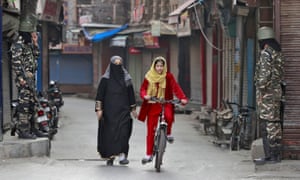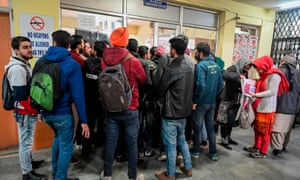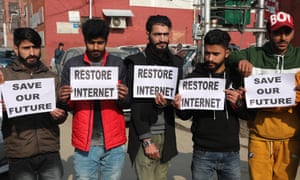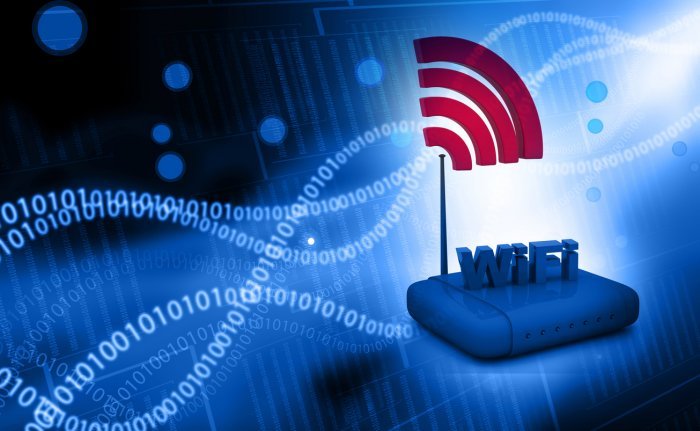For many in Kashmir, it has been more than 150 days of agony. The internet blackout which was imposed on the disputed Himalayan region by the Indian government in August is now the longest on record, and has left people’s lives, jobs and the economy in tattered ruins. It has also, according to doctors, cost lives; how many, they say they will never know.
For Imran Hafeez, a 43-year-old doctor with nearly two decades’ experience as an intervention cardiologist, it has meant watching the devastating demise of his revolutionary and lifesaving initiative, Save Heart Kashmir.
In Kashmir, where mountainous terrain and archaic road networks mean travel can often take days, patients suffering from cardiac emergencies often don’t have access to specialist doctors or major hospitals in time. But through a volunteer network, 1,200 doctors across the region were connected to each other through four groups on WhatsApp, the instant internet messaging app, where they shared reports of cardio emergencies and sought instant diagnosis.
“It was the best virtual hospital and doctors were united by WhatsApp. It was a wonderful initiative,” said Hafeez, proudly recounting one of their cases, where a young man in a remote mountainous region was displaying sinking blood pressure and severe chest pain and quickly slipping towards an imminent death. The medic attending to the man posted a message on the group and, several hundreds of miles away, Hafeez instantly recognised that the man was having a heart attack.
“Hit him quickly,” Hafeez wrote to Sheen, the medic who had sent the patient’s ECG from remote Ladakh. “Get two IV access. Start Thrombolysis. And another (IV) give 20ml Bolus NS. Don’t waste time.” Ninety minutes later, the young man was stable and conscious.

Over the 500 days it was running, the group operated round the clock and analysed 38,700 ECGs, handled 19,395 cases and administered thrombolysis 778 times to clear blocked veins. That was until 5 August, when an indefinite internet suspension was imposed upon the region and, five months on, shows no sign of being lifted.
“All is gone … this is so depressing,” said Hafeez. “We definitely saved lives and it was going very well until everything broke down. I don’t know how many patients we have lost, but patient care has definitely suffered.”
The decision by the Indian government, led by prime minister Narendra Modi, to revoke Jammu and Kashmir’s constitutional autonomy and split it into two territories under the control of the federal government – bringing an end to seven decades of semi-autonomous rule – was followed by a series of militaristic measures.
Tens of thousands of troops moved in, former chief ministers, legislators and separatist leaders were detained, curfews and travel restriction were imposed and all communication methods, including phone access to the internet, was cut off. While the crackdown has eased, many restrictions remain and seven million people in Kashmir are without the internet.

The administration, which has suspended internet services by invoking sections of the British colonial era Indian Telegraph Act of 1885, defended the blackout by arguing that “provocative and instigating material was posted from the internet connections and Twitter handles and other social media sites”.
It is now the longest internet shutdown ever imposed in a democracy. It is also becoming what civil society groups and freedom of expression activists have called a “worrying trend” by the BJP government, where, at the first sign of unrest, they block the internet almost instantly, as has been seen recently when a wave of protests swept across India opposing a new citizenship bill seen as discriminatory to Muslims. In the past month, shutdowns were imposed in areas of Assam, across the whole of India’s most populous state Uttar Pradesh, and, for the first time, in the capital, Delhi.
Indeed, India now holds the inglorious title of being the internet shutdown capital of the world, and last year it shut off the internet a record 106 times. It is not only damaging to freedom of expression but an economically costly tool of repression: Indian mobile operators lose about 24.5 million rupees (£270,000) in revenue every hour they are forced to suspend internet services.
“According to law, an internet shutdown can only be imposed is if there’s a public safety precaution or a public emergency, but unfortunately these two words are not defined in any legislation of India,” said Radhika Jhalani, a fellow at SFLC.in, an advocacy group that has tracked internet shutdowns in India since 2012.
“Every time the government feels there will be civil unrest, rather than dealing with it through democratic means or addressing the root causes, they shut down the internet because it’s the easiest thing to do. It’s been three days into 2020 and we already have two internet shutdowns.”
Jhalani also pointed out that several recent studies found that it is a myth that internet shutdowns curb unrest; instead they often contribute to a rise in turmoil.
The impact of the shutdown in Kashmir has proved calamitous to the economy, crushing innovation in the region and leading to a mass exodus of young people in search of new jobs. Each morning, hundreds squeeze on to the train that travels out of Kashmir’s capital, Srinagar, locally dubbed the “internet express”, desperately getting out of the region to carry out basic admin, register for law and medical entrance exams, contact family and find new employment miles away from home.
Shayan Nabi was once the proud owner of a small start-up company, Harmukh Technologies. The company, which ran online advertisement campaigns for domestic and foreign clients was among the many casualties of the blockade as business was impossible without internet access.
“It is depressing to be jobless. I want to go home, but then what will I tell my family?” Nabi, 30, asked as he searched for future options in New Delhi, 500 miles away, joining a wave of disenfranchised Kashmiri youths forced to leave their homes over the past five months.
“I left a bank job for this, I dropped out of MBA for this, because I wanted to do something of my own,’’ said Nabi. “But more than being angry I feel helplessness: what can I be angry about and against whom?”
The toll has not only been economic. A software programmer working in a Srinagar-based tech company, which had relocated for several months to the southern Indian city of Bangalore after its internet lifeline was snapped, described the experience as an “emotional hell”. “We had no contact with our families and even our families had no information if we are alive or not,” he said.
It is unclear when the Indian government intends to allow full internet access in the region. Some IT companies have been given access but under stringent restrictions, including complete government monitoring of their activity and a ban on social media sites. This week, SMS services were restored, and 80 government hospitals were given access, although there are more than 1,000 private hospitals and medical facilities still unable to connect to the internet, which doctors say has severely affected treatment and access to medicines for patients.
Sheikh Ashiq, president of the eight-decade-old Kashmir Chamber of Commerce and Industry, said the losses incurred by the region due to the internet shutdown are estimated to be well over £1bn. “Let me explain this: tourism is entirely dependent on internet and who will come to a place without internet for leisure tourism?” said Ashiq, who said thousands of artisans and weavers had been left without work as connections with their foreign clients had been severed and they could no longer sell their products online.
Ashiq described the current situation as “agony”. “It’s affected us badly,” he added. “We live in a world with an internet-based economy and we live in a place where there’s no internet. While people all over world over wished each other happy new year, we couldn’t even send a simple text to anyone.”
[“source=theguardian”]






